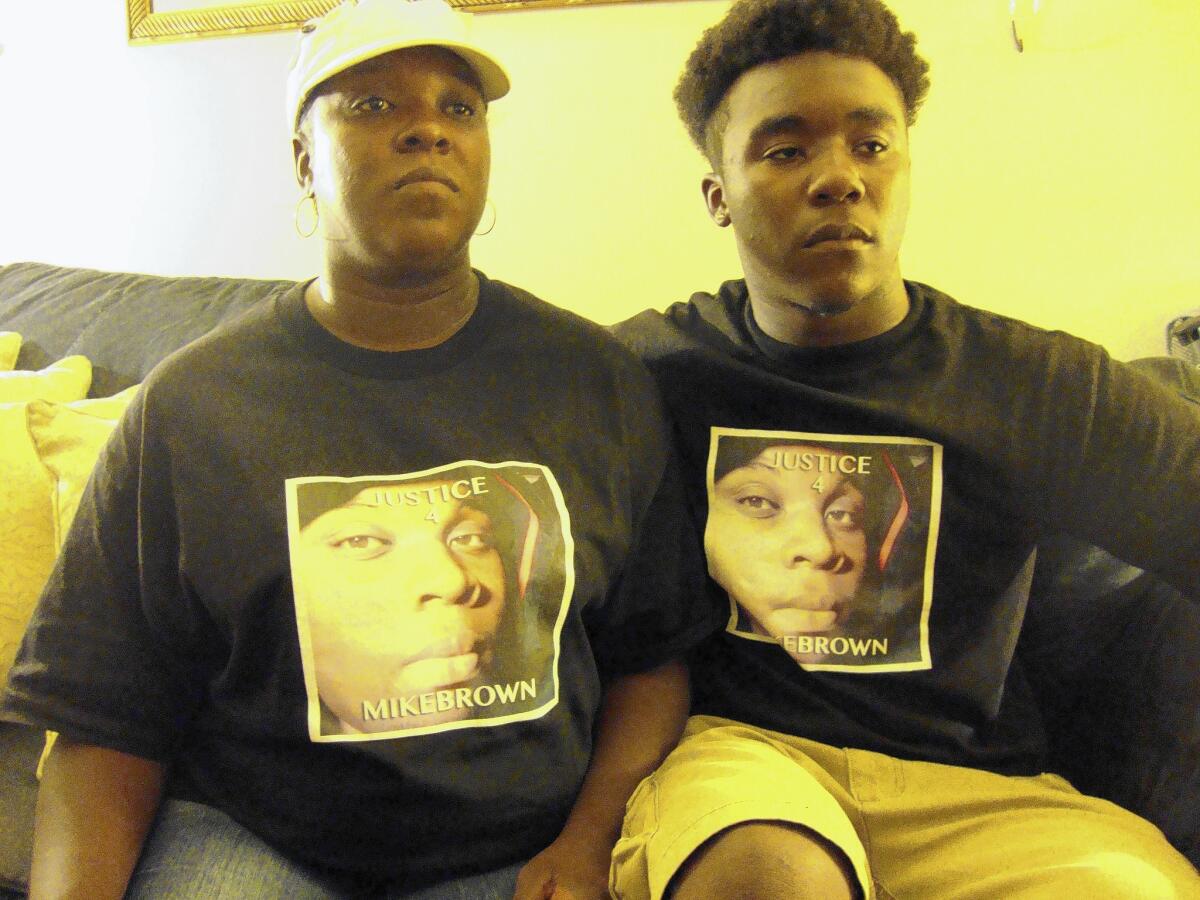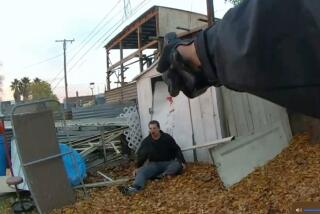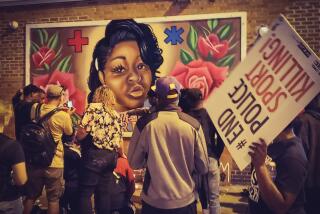A mother’s lament: For young black men, high stakes and hard rules

- Share via
Reporting from FERGUSON, Mo. — Christine Ewings learned in a phone call from a friend that her street had been closed because a young black man had been shot by police.
Ewings was not surprised. Months earlier, she was so worried about police stopping her 16-year-old son that she sent him to live with his father in quiet southern Missouri.
Then she learned that the man killed on Aug. 9 was her cousin, 18-year-old Michael Brown, or “Mike-Mike,” as everyone in the neighborhood called him.
Ewings, 46, rushed to the scene, where she found Brown’s mother huddled next to the yellow police tape, staring at her son’s body in the street. “She cried until she couldn’t cry anymore,” Ewings said.
It was every mother’s nightmare, but particularly here in this black neighborhood, where there is no harder or more painful task than trying to keep your son safe, Ewings said. It takes constant attention and diligence.
A young black man here is a potential target, a victim and a suspect, she said.
Ewings, a certified nurse assistant just retrained as a phlebotomist, had struggled to parent her son, facing the same challenge as Brown’s mother, a grocery store clerk who lives nearby.
She knew the stakes were high. She wanted to set her son free slowly, to let him grow into being a man. But Ewings knew she had to keep him in line or he could end up dead in the street.
Ewings has three daughters, but she knew her son Daryus Watson would face distinct challenges. She tried to teach him what she figured all young black men needed to know: Stay in at night. Don’t hang out, not even on the stoop. Don’t engage with police. And be respectful to a fault if you get stopped.
“Just say, ‘Yes sir’ and let them deal with me,” she would tell her son, warning him that it was only too easy to provoke police and get arrested.
“Don’t engage with them, because they only need a reason,” she would say.
Daryus chafed at her rules. One night when Ewings came home early from a late shift, she caught him hanging out on the stoop. Another time, she found him at a neighbor’s house at 3 a.m., playing video games.
Now he lives with his father, who is helping him with his latest passion: boxing. Daryus got a summer job at a Hardee’s restaurant, and is a B and C student on track to graduate. He has plans to go to technical school and become a welder. After his cousin’s shooting, he returned to visit his mother, who has kept him in her sight.
Daryus, like Brown, does not have a criminal record — something else she counseled him to avoid.
“You’ve already got two strikes against you,” she would say. “You’re black and you’re a man. Don’t let them give you a third strike, getting locked up.”
Ewings grew up here, attending public schools that were racially mixed. But neighborhoods remain self-segregated, she said. White parents don’t live in her world, where sons must be trained to withstand police scrutiny.
“I just don’t hear about them shooting a white boy to death in the middle of the street,” she said.
Brown, who lived with his grandmother in a nearby housing complex, would stop by to see Daryus.
The two would play video games and talk about freestyle raps that Brown composed under the moniker Big’Mike and posted online — including “Heaven,” “Lights Out” and “Body Bag.”
In one song, Brown talked about his hopes:
Everybody has their problems and their issues.
I just want to be one of them few that make it out of the hood,
come back, help my people out,
my hood and the people I grew up with.
Brown, the eldest of four children, connected with his disabled grandmother and came to stay with her in recent years, attending a local high school.
“She was working with him, keeping him focused,” said Ewings, wearing a “Justice for Michael Brown” T-shirt.
At times, Brown and his grandmother clashed. He left days before the shooting to stay with friends in a neighboring apartment complex.
“I’m stayin with my home boi right now cause my peoples don’t believe in me — that’s sad,” he posted on Facebook, where he went by “Big Mike.”
But by the day of the shooting, they seemed to have reconciled. “OK, I believe that everyone had faith in me the whole time,” Brown posted.
One of Brown’s greatest challenges was his size, at 6-foot-4 and 292 pounds, Ewings said. He was so tall his mother had to reach up to hug him. In this neighborhood, size can be a liability, turning young men into threats in the eyes of the police.
When police released surveillance video of Brown purportedly confronting a shorter, older mini-mart clerk before the shooting, grabbing a bunch of cigarillos and storming out, they called it a robbery. Ewings said if Brown had been smaller, or of a different race, the incident might be judged differently.
“Nobody’s an angel,” she said.
Ewings joined relatives and friends for a rally at Greater Grace Church on Sunday that drew more than 1,300 people.
Missouri State Highway Patrol Capt. Ronald Johnson, who took control of the police response last week from local officers at the direction of the governor, addressed the crowd, apologizing for the often harsh treatment black men have faced from law enforcement.
“I wear this uniform. And I should stand up here and say I’m sorry,” said Johnson, who is black.
Johnson told the audience that he too had a son at home with sagging pants, cap askew and tattoos on his arms.
He said Michael Brown was “going to make it better for our sons,” he promised.
Ewings burst into cheers.
“He apologized for the police,” Ewings said. “Somebody like him standing up there in a position of authority gives you hope.”
More to Read
Sign up for Essential California
The most important California stories and recommendations in your inbox every morning.
You may occasionally receive promotional content from the Los Angeles Times.











